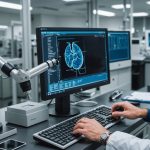Introduction to AI in Nutrition Planning
In recent years, AI in nutrition planning has become a transformative force in how individuals manage their diets and overall health. By utilising sophisticated algorithms, AI can provide tailored dietary recommendations, ensuring that each person receives a personalized nutrition plan tailored to their unique needs. This approach not only enhances individual health but also helps in preventing nutrition-related diseases.
With the rise of health tech in the UK, there has been a significant integration of AI tools in health management systems. This integration facilitates the analysis of dietary habits and nutritional needs, enabling healthcare providers to offer more personalized nutrition solutions. As the importance of AI continues to grow, it is expected that these technologies will make a substantial impact on public health and diet management practices.
Also to read : Mastering Influencer Marketing: A Guide to Crafting Successful Campaigns for Beauty Brands in the UK
Moreover, AI serves as a bridge between cutting-edge technology and traditional nutritional science, offering insights that were previously difficult to obtain. By considering individual factors such as genetics, lifestyle, and medical history, AI systems provide a tailored approach to diet planning. This personalization is central to the effectiveness of AI in addressing the diverse nutritional needs of the population.
Innovations in Health Tech for Nutrition
The evolution of health technology innovations is transforming the way individuals approach nutrition, particularly through AI applications in nutrition. These advancements are being developed extensively within the health tech UK industry, driving significant progress.
Also to see : Unlocking Efficiency: Strategies for UK Food Delivery Services to Enhance Logistics Management
AI Algorithms and Machine Learning
At the core of these innovations, AI algorithms are pioneering the analysis of dietary needs. By sifting through vast datasets, these algorithms can identify dietary patterns and deficiencies, providing precise recommendations. This process leverages machine learning to predict and suggest nutritional alterations tailored to individual needs, enhancing personal health outcomes.
Integration with Wearable Technologies
The impact of wearable tech on personalized nutrition is noteworthy. Wearable devices track real-time health metrics such as caloric intake, hydration levels, and nutrient absorption. Integration of these devices with nutrition-focused AI not only supplies instant analysis but also promotes healthier lifestyle choices by keeping users informed and motivated.
Mobile Apps and User Accessibility
Mobile apps play a crucial role in facilitating nutrition plans and allowing users to craft and manage their dietary habits seamlessly. These platforms employ AI applications to offer personalized dietary advice, track grocery essentials, and even suggest recipes based on available ingredients. The accessibility of these mobile interfaces ensures that cutting-edge nutritional guidance is available to individuals anytime, anywhere.
Case Studies of Successful AI Nutrition Plans
In recent years, AI-driven nutrition plans have become significantly popular in the UK, leading to notable improvements in health outcomes. Several case studies highlight the success stories associated with these plans.
One compelling example stems from a fitness center in London, where AI-based nutrition was employed to create personalized dietary strategies. Users reported noticeable improvements in their overall health within weeks. For instance, people with specific dietary needs observed enhanced energy levels and better weight management outcomes.
Another study featured a user diagnosed with type 2 diabetes whose AI-tailored plan helped in achieving optimal blood sugar levels. By adjusting meal timings and portion sizes, the nutrition plan offered measurable improvements, illustrating the potential of these case studies.
Testimonials from users further underscore the efficacy of AI-driven nutrition. Jessica, a 34-year-old teacher, shared how her AI plan transformed her diet, promoting sustainable eating habits. She mentioned, “My energy levels are consistently high, thanks to my personalized nutrition guide.”
These AI nutrition examples demonstrate the transformative power of technology when applied thoughtfully. It’s clear that tailored approaches guided by AI can produce tangible benefits, enhancing individuals’ well-being.
Challenges and Ethical Considerations
Navigating the intersection of AI and nutrition involves unique challenges, particularly concerning ethical considerations. As AI-driven solutions become more prevalent, understanding these issues becomes crucial.
Data Privacy Concerns
One of the significant challenges in AI nutrition is data privacy. Personal data is often required to tailor nutritional advice. This raises important questions: Is your data stored securely? Is it shared with third parties without consent? The use of sensitive information necessitates stringent safeguards to prevent unauthorised access and misuse.
Bias in AI Algorithms
Bias in AI algorithms is another critical concern. AI-driven nutrition plans might reflect biases present in the datasets they’re trained on, leading to skewed recommendations. For instance, certain demographics might receive inaccurate dietary advice if they are underrepresented in training data. It’s essential to actively identify and mitigate these biases to ensure balanced and realistic nutrition plans.
Accessibility for Diverse Populations
Ensuring that AI nutrition technologies are accessible to diverse populations is vital. Many might lack access to these innovative solutions due to economic, technological, or educational barriers. To address these ethical considerations, developers should prioritise inclusive design and equitable access to ensure these benefits are available to all, irrespective of socio-economic status.
Future of AI in Nutrition Management
The future trends of AI in nutrition management are poised for significant transformation. As we look ahead, predictions suggest that AI in health tech will become increasingly sophisticated, offering personalised nutrition plans based on a comprehensive analysis of individual health markers, including genetic data. This will lead to the creation of dynamic nutrition plans that adapt in real-time to a person’s changing needs.
Advancements in nutrition planning will likely see AI algorithms providing precise dietary recommendations that are capable of aligning not just with nutritional needs but also with preferences and lifestyle. These advancements could make healthy eating more accessible and tailored than ever before, reducing the complexity surrounding nutritional choices.
User input will continue to play a pivotal role in developing these powerful AI technologies. As users consistently interact with these systems, feedback will drive improvements and innovations. This iterative process ensures that AI solutions remain both practical and relevant, adapting to the nuances of human health and dietary trends. Ultimately, the partnership between user input and AI could herald a new era in health tech, offering unparalleled benefits in personal health management.











